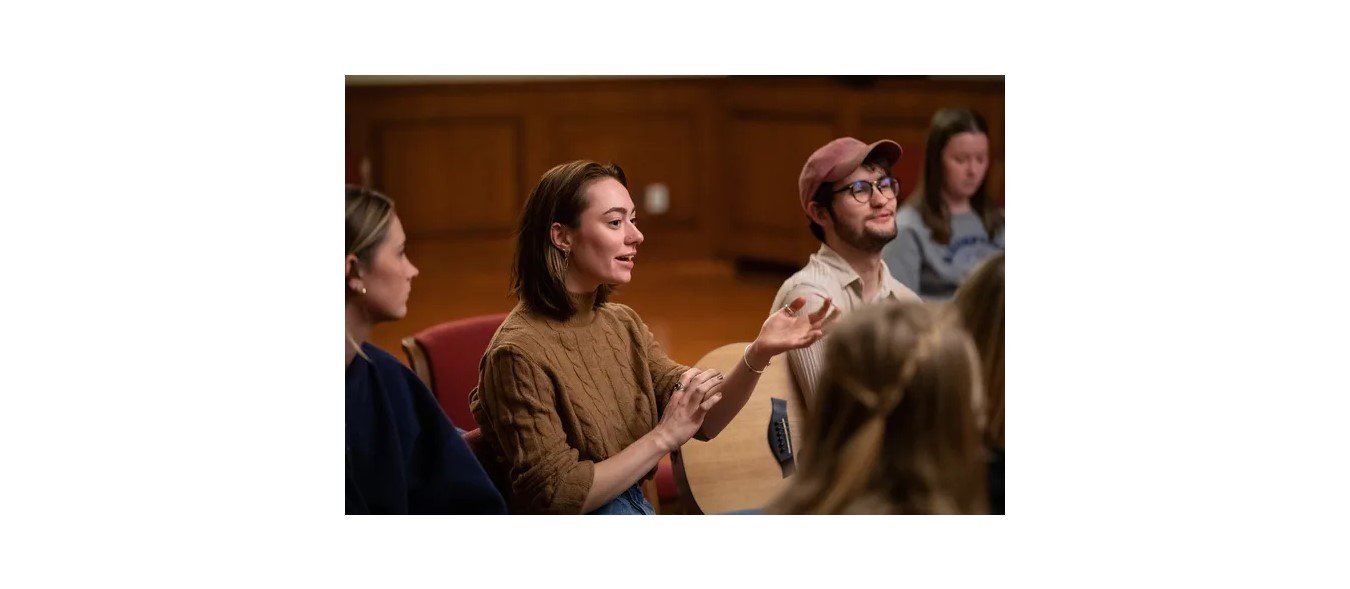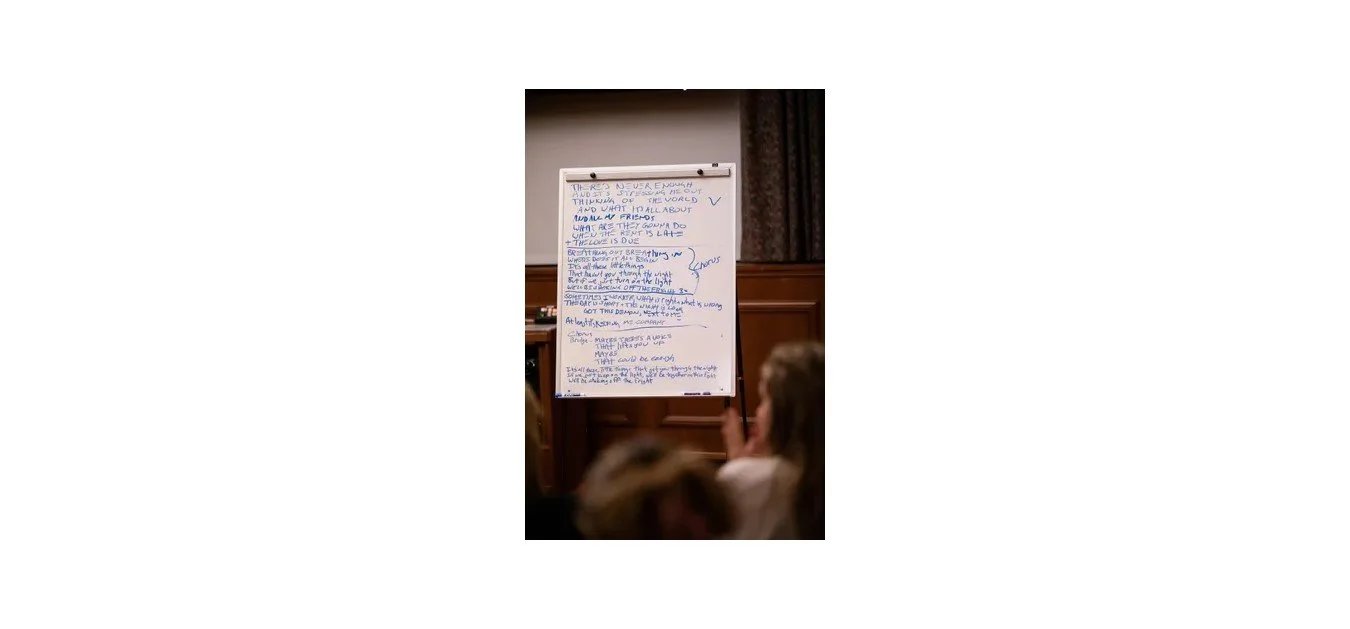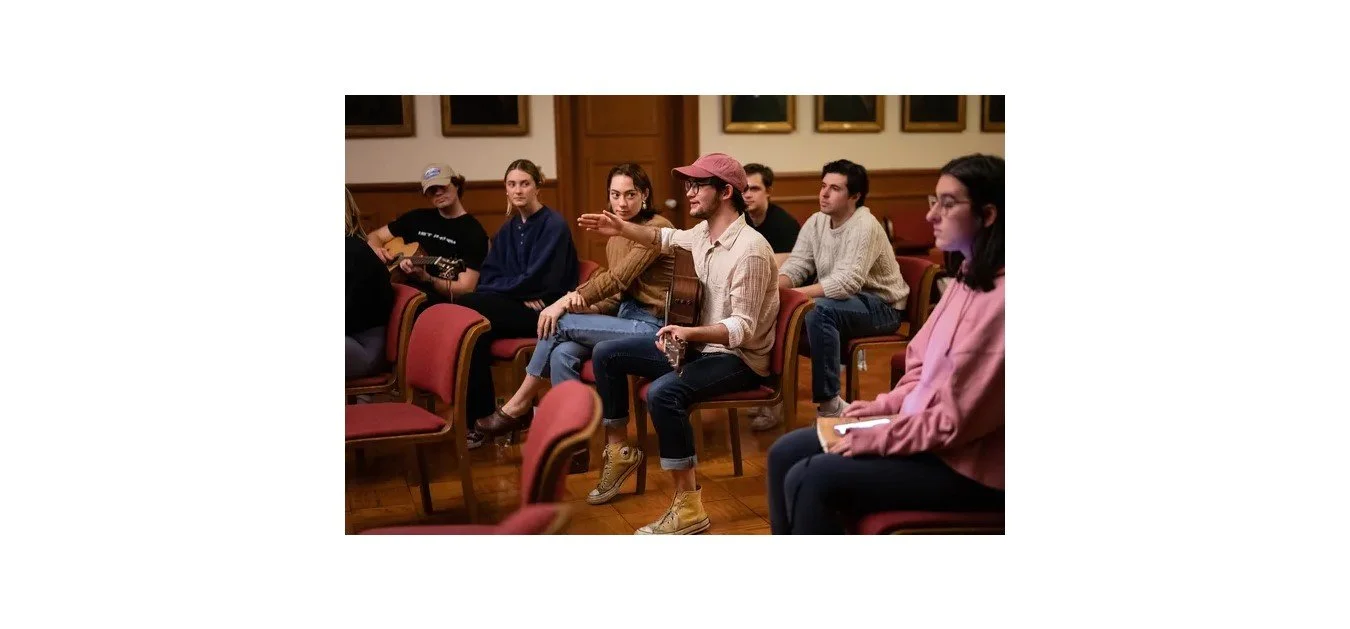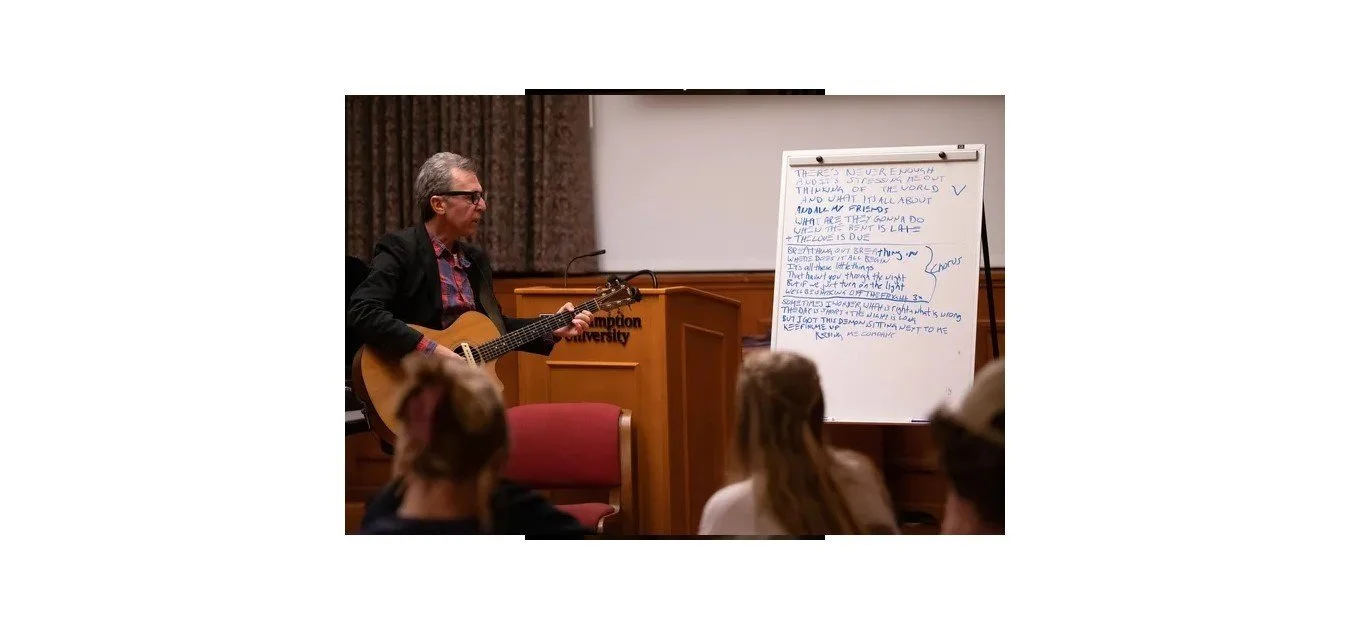Stephanie Jarvis Campbell, Worcester Magazine ‘We started focusing on hope’: Songwriting workshops link music, mental health
Same Thing Project connects songwriting, mental health and colleges. From Worcester Magazine, an article by Stephanie Jarvis Campbell
Erik Kane and Mark Cutler
Written by Stephanie Jarvis Campbell, correspondent for Worcester Magazine
The Same Thing Project and the National Museum of Mental Health Project are bringing an innovative songwriting workshop to colleges with a goal of creating and spreading positive emotions and awareness on campuses in Worcester and beyond, with a recent kickoff event at Assumption University.
A relatively new concept, according to those involved, community songwriting is described as “discovering one’s voice, alongside others, to create words and music for shared experiences and emotions – everyone becomes a songwriter.” With no music experience required to participate, the events bring together people from all ages, abilities, backgrounds and careers.
The workshops, and the resulting Same Thing Project, are “about finding a commonality. We all breathe the same air, we all see, we all feel things,” said founder Mark Cutler, an inductee in the Rhode Island Music Hall of Fame and solo artist who also was part of the bands The Schemers and Raindogs.
Cutler created The Same Thing Project in 2016, after working with Jim Wolpaw, an Oscar-nominated filmmaker, on a project about the Ladd School, a residential institution for children with intellectual and developmental disabilities in Rhode Island that closed in 1994. Cutler, who at the time had left his day job to pursue music again and was searching for “something meaningful,” he said, was asked to write the soundtrack for the film.
“It was my first in-depth exposure to people with developmental disabilities,” he said. “They’re part of the community. … We have more in common with each other than differences.”
Creating songs together
Cutler began holding free community songwriting workshops at the Outsider Collective in Pawtucket, Rhode Island, that still run on Tuesday mornings. The free workshops allow people to gather together to talk about life and brainstorm song lyrics; by the end of the session, the participants have a full recorded song that is accompanied by music played by Cutler. They also share songwriting credit.
At the workshops, everyone’s ideas are valued – sometimes a lyric used in the song is the exact one someone offered, and even if the words aren’t used in their purest form, it provides inspiration for the final outcome, Cutler said. “People leave these workshops feeling better. I don’t know if ‘happiness’ is the word, but I know they leave feeling better than they did,” he said. "Even if you didn’t make a statement, even if you didn’t say a word, you being there counted. I believe everyone’s energy affects surroundings.”
Some of the songs that are created in the workshops get recorded in the studio; 10 from past sessions appear on the album, “Walks of Life Collaborations,” which can be found on iTunes, Spotify and 75orLess Records. Cutler said he also recently received a grant to pursue a new recording of songs developed in the workshops.
Since creating The Same Thing Project, Cutler has run hundreds of the songwriting sessions, mostly in Pawtucket, but also at a camp for developmental disabilities, nursing homes, public squares and self-advocacy groups. “I’d love to do it as a team-building exercise,” he said. “I think it has value everywhere.”
Last year, The Same Thing Project joined forces with the National Museum of Mental Health Project, a Milford-based nonprofit organization co-developed by Paul Piwko and Alexandra Orlandi, a 2019 Assumption graduate. After hearing about the workshops and then attending one in August 2021, Piwko was completely captured by the events that took place and felt that The Same Thing Project’s purpose would align with the National Museum’s mission of “strengthening mental health literacy through the arts nationwide by bringing the exhibition to you.”
Cutler felt the same, he recalled, saying, “I think they’re both righteous programs, and it’s nice to do something you believe in.”
Kaylea Berger suggests lyrics
“It was one of the most moving, important 90 minutes I had in 2021,” Piwko said, adding how it was amazing to watch community gathered create a song word by word. “In a world where everyone is looking at their cellphones for the next thing, it’s so rare to experience something where everyone is together. … There are just not that many that areas in society where people can come together and create something and get to know each other in the process.”Last year, The Same Thing Project joined forces with the National Museum of Mental Health Project, a Milford-based nonprofit organization co-developed by Paul Piwko and Alexandra Orlandi, a 2019 Assumption graduate. After hearing about the workshops and then attending one in August 2021, Piwko was completely captured by the events that took place and felt that The Same Thing Project’s purpose would align with the National Museum’s mission of “strengthening mental health literacy through the arts nationwide by bringing the exhibition to you.”
Reaching college students
Since the collaboration formed between The Same Thing Project and the National Museum of Mental Health Project, the community songwriting experience is now expanding to college campuses. In March, Cutler was asked to lead a workshop at Dean College in Franklin, where more than 20 students attended and wrote a song titled “What’s Gonna Happen.”
Then, through the work of MBA students that Piwko previously taught, the idea for the Community Songwriting for Mental Health College Tour emerged. Emily Taylor, an adviser for the National Museum of Mental Health who graduated from the College of the Holy Cross last spring, played a large role, as she developed the wording for the definition of community songwriting used on the website and on fliers.
The final lyrics of the song written collectively during our Community Songwriting workshop at Assumption University
Eric Kane, a graduate student at Clark University and intern for the National Museum of Mental Health Project, has worked on development and outreach. In addition, as part of Piwko’s Small Business Management & Entrepreneurship class at Assumption, two senior student interns, Zachary Khallady and Seth Bogoslofski, are working on plans to promote the tour to colleges in Central Massachusetts and Connecticut. Although the semester is ending in December, they will have created the plans for the next set of interns to continue the work, as the intent and goal is for the tour to remain student-developed.
“I hope to see this project growing in the future for sure,” said Khallady, an economics major. He noted that similar songwriting events could potentially benefit high school seniors as well.
The first official tour stop was at Assumption’s La Maison Salon, sponsored by the campus chapter of Active Minds, a national organization that works to create awareness on college campuses about mental health. “I’ve never experienced anything like it,” said Anna Mullen, a senior and president of Active Minds. “It was so much fun.”
When Cutler opened the session by asking what everyone was thinking about that night, one of the Active Minds board members said “inflation,” which began the collaborative songwriting process, Mullen said. “We started focusing on hope, which is in line with the Active Minds mission,” she said.
“We had a small group that attended, but it was more intimate. It was a more personal setting,” said senior Julie Sutherland, co-president of Active Minds. “It was empowering.”
By the session’s end, about an hour and a half later, the 14-person group had created a song titled “Shaking Off the Fright.” Sutherland said she loved seeing the energy in the room, with everyone building ideas off each other, and Mullen added, “I was amazed at what we were able to do in such a short amount of time.”
By the end, everyone was genuinely excited about the event and the song they helped create, Cutler said. “It seemed like a great way to get to know your neighbor and to let your neighbors know you a bit, too. It’s also a positive way to show each other that we’re not alone,” he said.
Kane agreed, saying it was “really cool to see people who didn’t know each other bouncing ideas off each other and making this one thing. … I think everyone there contributed something.”
Eric Kane Suggests an idea
Program 'changed the direction of my life'
A communications major, Kane brought his guitar and was able to provide some of the background music for the song that was created. But beyond that, the event struck a personal chord for him. As an undergraduate student, he came to Clark to study economics and management, but quickly realized he didn’t have a passion for that field. While struggling with depression and anxiety, he eventually decided to take a leave of absence and then returned as a media, culture and arts major. “I still struggle with that, but it seems more manageable,” he said.
That focus on the arts, Kane said, “helps ground you in the present,” and he added it “really changed the direction of my life.”
Now, he makes handmade journals, plays guitar, writes songs and dabbles in printmaking. “It helped me so much, and having an outlet makes me realize I love the arts and makes me realize how powerful the process can be. It helps me feel more calm and balanced,” Kane said.
The folks at the gathering, collaborate on their new song
Likewise, the community songwriting project can help in similar ways, “especially at colleges, I think it’s a really good bridge for people who maybe never felt connected to music arts in a participatory way,” Kane said. “I think it can really open a lot of people up to parts of themselves that they weren’t open to.
Mullen and Sutherland agreed, saying that the session was beneficial in many ways to promote mental health awareness, as well as for students to come together, relax and have an opportunity to see that their thoughts and feelings might be shared by others.
Mark Cutler helping the songwriters realize their ideas
“I think this event was really important to help break the stigma,” said Mullen, who added that they would love to have Cutler return in the spring for another songwriting session.
Kane, who said he’s enjoyed working on the program from “the ground up” because it is a new initiative, would love to see it become more widespread. “Even though we’re aware of the stigma (of mental health) as a society more than before,” he said, “that doesn’t mean the work is done.”





